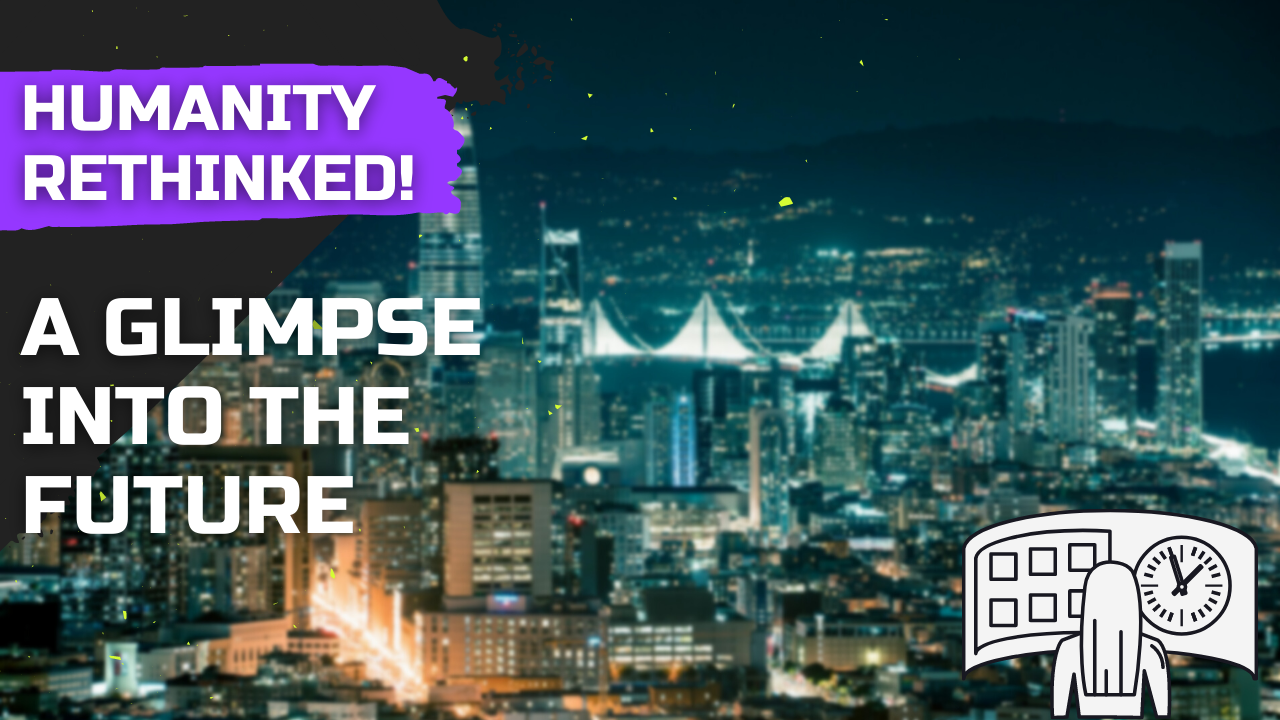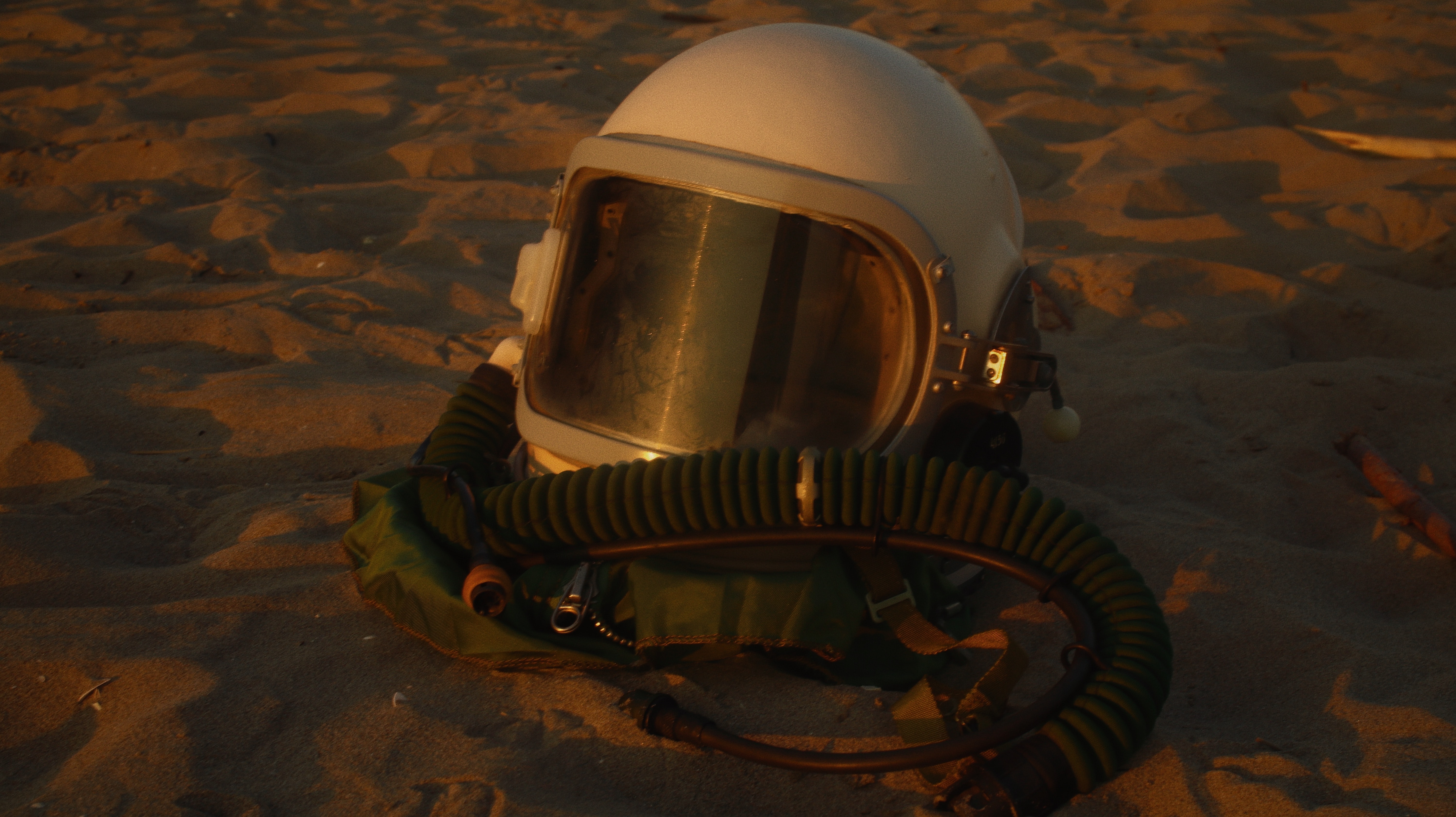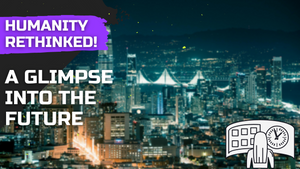
Humanity Rethinked! A glimpse into the future | The future of Humanity
Humanity Rethinked: How does the future civilizations look like?
We are on the threshold of the sharpest, fastest, and most revolutionary transformation of human civilization in recorded history. Hunting evolved into agriculture and cities ten thousand years ago as did the move from the countryside to cities.
By the end of the 2020s, technological convergence will disrupt the five essential sectors that underpin the global economy as well as every major sector. As extraordinary as the possibilities that emerge are the knock-on effects for society.
The Underestimated Magnitude

A machine that is by an order of magnitude (10) more efficient will consume 90% fewer resources and generate 10x-100x less waste than a production process that does not have a high component efficiency. A world built on photons, electrons, DNA, molecules, and (q)bits will replace one centered on centralized extraction and the breakdown of scarce resources that depends on the extensive physical scale and reach. Physical production and distribution will be fulfilled locally while product development and design will be done cooperatively over the internet.
Consequently, geographic advantages will disappear as cities and regions become self-sufficient. Our production system will be built with the use of current technology, which will add greater excitement, resilience, and robustness than anything we have seen before. Changing from an extraction-focused world to one focused on the creation, from a scarcity-centric world to one rooted in abundance, from an inequity-driven world to one shared with everyone.
The next Industrial Revolution has not occurred, but instead, a fundamental change has occurred. We are entering a new era of human freedom.
How's the New Era going to be?

We have never seen possibilities like these before. Approximately 10-15 years from now, the American Dream will likely cost less than $100 a month. Poverty was easier to eradicate than ever before in history. We could eventually include all of our basic needs - food, energy, transportation, information, and shelter - in the notion of the right to have access to them. Many conflicts for resources could be largely avoided if lack of access and control drove them.
By delivering zero-carbon energy, transportation, and food with minimal waste, a new production system could counteract climate change and environmental degradation caused by production processes that don't consider the impact they have on the natural world. By doing so, we could help reduce the impact of our unsustainable actions on the health of humans and restore the stability of our planet's natural systems.
Ultimately, we may be able to escape toil and drudgery completely and, for the first time in history, attain true freedom, free from the burdens of economic precarity and the need to provide for our families. At this time in human history, humanity has been presented with such an astounding array of possibilities.
What's the catch?
There is no guarantee that this future will come about. In truth, technological advancement is not sufficient to achieve it. Technology has improved organizational abilities as leading civilizations have progressed throughout history. An organization's planning system determines how close a society can come to the potential of its technological capabilities.
The Organizing System comprises the fundamental beliefs, institutions, and reward systems that allow optimal decisions to be taken over time in a society, as well as its structures for managing, controlling, governing, and influencing it. For an Organizing System, like that of Rome, a city of ten thousand people like Sumer would be different from a city of ten million like Rome. Using the best combination of technology and Organizing System dictates who wins.
What the past reveals?
Throughout history, advanced innovations in the five foundational sectors have led to the emergence of new and increasingly capable civilizations. Combined with improved organizational capabilities, this has only been possible.
In the past, incumbent governments have struggled mightily with this challenge, and history is sobering - every major civilization has come to an end after reaching the limits of its capacity to organize society and solve the problems created by its production system. The civilizations that were facing collapse pinned their hope on recapturing their glory days and improved their Organizing System rather than adapting. As a result, we descended into the dark ages.
Freedom mistaken again and again!

Many of the mistakes that senior executives made in the past still occur in government and industry today. History has a clear pattern. In the 2020s all five of the foundational sectors that paved the way for Western dominance will collapse. A society that created the Industrial Order and built modernity simultaneously and destroyed the rest is epitomized by the disruptions in the industrial sector.
There is also an increasing sense that our civilization has reached its limits as a result of inequality, extremism, populism, the erosion of representative democracy, the accumulating impact of financial insecurity, ecological degradation, and climate change.
These challenges are being met by today's incumbents. There is a tendency to centralize more, to extract more, to exploit more, and to compromise public health and environmental integrity in the name of competitive advantage and growth. The situation is no less desperate than the response from previous civilizations facing collapse who erected walls, commissioned priests, and offered sacrifices of blood.
In the coming years, new technologies will continue to innovate and disrupt. Ironically, we are using outdated and incompatible technologies to solve many of our burning problems, as well as aggravating our Organizing System.
The death of the Old System & Civilizations of Future
Our antiquated organizational system is already being challenged by the new, creation-based production system. There have already been disruptions in sectors such as the information industry. In a globally interconnected global network, content can be generated at near-zero cost by billions of consumer producers with few barriers to entry and high entry costs.
Check out: Why are Chinese Products Cheaper? A closer look!
Our organization's Organizing System is incapable of understanding or managing the new problems that this emerging production system has created, in addition to the extraordinary benefits it has provided. The spread of false narratives, polarizing public opinion, paralyzing decision-making processes, and facilitating regime change in another country can all be accomplished by computer hackers.
Individual nations are no longer controlling the narrative, and the dissemination of information is unrestricted. In the 2020s, disruptive forces will affect the energy, food, transportation, and materials sectors simultaneously, presenting further unprecedented new challenges, while solving old ones.
The Dilemma

Therefore, we have a stark choice -
collapse into a new dark age, or move to a new Organizing System capable of fostering an age of liberty. It will take more than rethinking institutions and structures that manage society - we will also have to change the very concepts upon which they are based. Despite what may appear to be fundamental truths, representative democracy, capitalism, and nationhood are merely human constructs caused by an industrial Organizing System. It is possible that they may well become redundant in the new age.
Check out: OnePlus Buds Z Long-term Review | Our Experience
We have a better understanding of the coming changes in society than ever before, and we have the foresight and capability to act on them. Therefore, we can choose whether or not to avert disaster. Humanity can achieve incredible heights with the convergence of technology disruptions on the horizon and eliminate poverty, inequality, resource conflicts, and environmental degradation for a fraction of what it costs here today.
As with every prosperous civilization before us, we have the option of preserving the failing status quo and devolving into another dark age.
There are no dark ages if there is no leadership. As long as America, Europe, or China have established mindsets, beliefs, interests, and institutions, it is unlikely they will lead. A winning Organizing System is more likely to be developed by smaller, hungry, more adaptable communities, cities, or states like Israel, Mumbai, Dubai, Singapore, Lagos, Shanghai, California, or Seattle. Their abilities will be far beyond those of their predecessors, just as they appeared from nowhere just like their predecessors. Those who are unaware of what is happening could get trampled before they have time to act.
The Ultimatum
Technology disruptions affect every aspect of the global economy, including economics, medicine, trade, media, and government, often leading to dramatic shifts in the global system and the creation of catastrophes like natural disasters, conflict, financial crises, and social upheavals. In response to every new crisis, we are sometimes tempted to look backward instead of forward, to mistake ideology for wisdom, and to hopelessly mistrust one another instead of following one another.
It is possible for us to build the wealthiest, healthiest, and most extraordinary civilization in history if we hold strong. If we fail to do so, our civilization will join every other failed civilization that historians will have to explore in the future. In either case, our children will either thank us for bringing them the Age of Freedom, or curse us for sending them back to the dark ages once again. Ultimately, it's up to us.



Comments